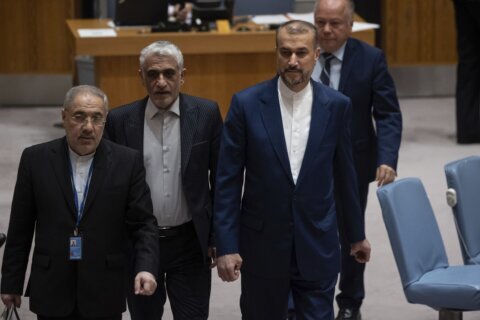UNITED NATIONS (AP) — The U.N. Security Council has slapped sanctions on three Houthi rebels linked to cross-border attacks from Yemen into Saudi Arabia and to fighting in the government’s last stronghold in the country’s north.
The United Kingdom said Wednesday it proposed the sanctions because the attacks into Saudi Arabia have killed and wounded civilians and because the Houthi offense in the central desert city of Marib has sought to cut off access to humanitarian aid and includes the use of child soldiers.
The three rebels added to the U.N. sanctions blacklist are Houthi chief of general staff Muhammad Abd Al-Karim Al-Ghamari, assistant defense minister Saleh Mesfer Saleh Al Shaer and Yusuf Al-Madani, a prominent leader of Houthi forces.
According to the U.N. listing, Al-Ghamari “plays the leading role in orchestrating the Houthis’ military efforts that are directly threatening the peace, security and stability of Yemen, including in Marib, as well as cross-border attacks against Saudi Arabia.”
Al Shaer, who is in charge of logistics, “assisted the Houthis in acquiring smuggled arms and weapons,” and as “Judicial Custodian” he was “directly involved in the widespread and unlawful appropriation of assets and entities owned by private individuals under arrest by the Houthis or forced to take refuge outside of Yemen,” the U.N. said.
It said Al-Madani is “commander of forces in Hodeida, Hajjah, Al Mahwit, and Raymah” engaged in activities threatening the peace, security and stability of Yemen.
The U.N. sanctions order all countries to immediately freeze the assets of the three Houthis and impose a travel ban on them.
Their addition brings the number of Yemenis under U.N. sanctions to nine, including Abdel-Malek al-Houthi, leader of the Houthi movement, and Yemen’s former president, Ali Abdullah Saleh, who reportedly died in December 2017.
Yemen has been convulsed by civil war since 2014, when Iran-backed Houthi rebels took control of the capital of Sanaa and much of the northern part of the country, forcing the internationally recognized government to flee to the south, then to Saudi Arabia.
A Saudi-led coalition entered the war in March 2015, backed by the United States, to try restore President Abed Rabbo Mansour Hadi to power. Despite a relentless air campaign and ground fighting, the war has deteriorated largely into a stalemate and spawned the world’s worst humanitarian crisis. The U.S. has since suspended its direct involvement in the conflict.
In early 2020, the Houthis launched an offensive in the mostly government-held Marib province that has cost the lives of thousands of young people and left thousands of displaced civilians living in constant fear of violence and having to move again.
Copyright © 2024 The Associated Press. All rights reserved. This material may not be published, broadcast, written or redistributed.







